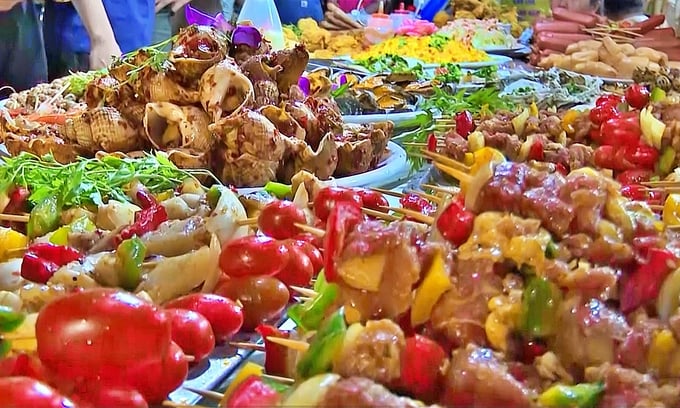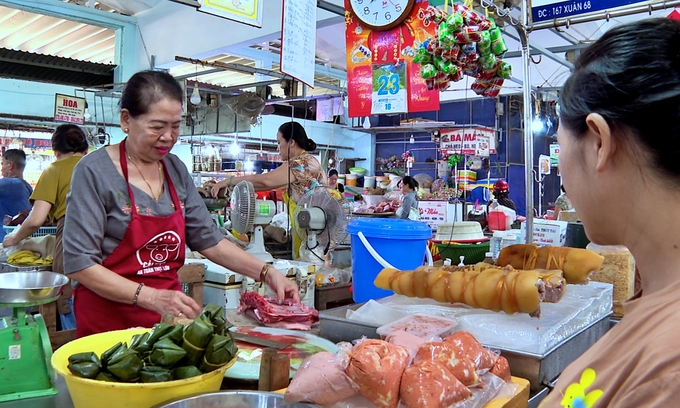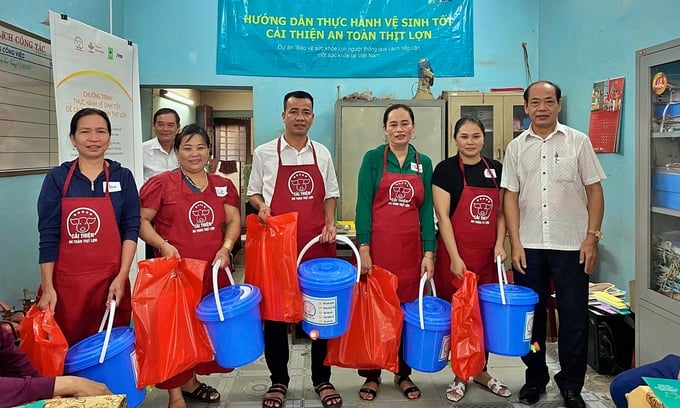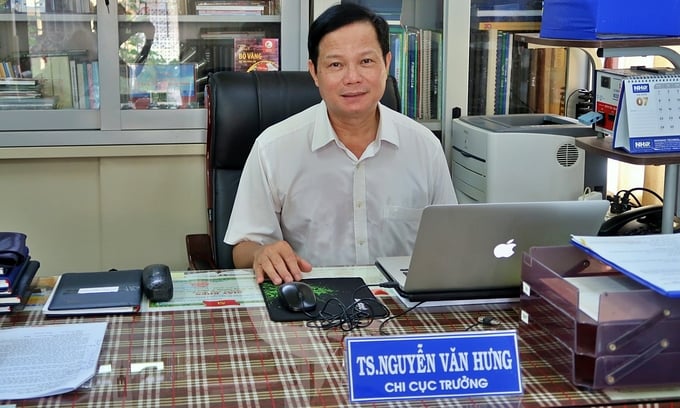May 16, 2025 | 10:04 GMT +7
May 16, 2025 | 10:04 GMT +7
Hotline: 0913.378.918
May 16, 2025 | 10:04 GMT +7
Hotline: 0913.378.918

A food stall for tourists in Thua Thien Hue Province. Photo: ILRI.
With a few years left until her 30s, a traveler and culinary enthusiast, Pham Thi Hai Ngan has set a goal of going on a food tour to all the famous places in the country, such as Hue, Hoi An, and the Mekong Delta, before getting married. What she always does as soon as she gets off the plane is to book a taxi and ask the driver to show her some "interesting" places to enjoy food. Ngan's priority is clear: clean restaurants that the local people recommend.
The choice of female tourists from Hanoi is understandable because places that attract many tourists always have the potential for food safety risks if they don't consistently maintain high food safety standards. Salmonella bacteria, which is the leading cause of diarrhea worldwide and many large-scale food poisonings, is a significant risk in Vietnam.
That's why, with her upcoming trip to Hue this summer, Ngan is more cautious. In addition to gathering information from local people, she is looking out for restaurants whose food safety standards have been certified by the authorities.
Nguyen Khanh Chi, a tourist from Nghe An province, shares this perspective, relying on Google Maps restaurant ratings. "I choose restaurants that are highly rated and reviewed by many people," said Chi.
As she often travels in large groups, Chi sometimes spends time exploring markets and dining at restaurants. In Hue, she was not only impressed by the cleanliness of food outlets but also surprised by the initiative of some pork shop owners who wore red aprons with the words "Improving pork safety."
Chi admitted to being drawn to the aprons and felt "more secure" when she learned that they were products the CGIAR One Health Initiative awarded. After participating in training and being introduced to the importance of equipment like cutting boards, knives, stainless steel trays, and complete sterilization equipment and soap from the research team, sellers can wear the "certificate," and their meat stalls are then also marked with a star-shaped food safety signage certifying their participation in the project.

A pork retailer in Dong Ba Market, Thua Thien Hue province participates in the CGIAR One Health Initiative intervention. Photo: ILRI.
Teams of researchers and university lecturers have used the idea of the aprons and star-shaped signage for a while. Dr Nguyen Van Chao of the Hue University of Agriculture and Forestry, a partner of the One Health Initiative, Chao had previously worked in many traditional markets and shared the concern of how to choose safe and hygienic food, particularly among tourists like Hai Ngan and Khanh Chi.
After extensive observations, he noticed that tourists were highly interested in certifications. But if it were simply a traditional piece of paper, it would not be attention-grabbing and would likely go unnoticed. When training with some retailers, the One Health Initiative researchers observed that the vendors placed great importance on the apron. It was a place to store money and also a place to wipe hands after washing. In essence, the apron is closely associated with the image of pork retailers, making it an effective medium for conveying the message of food safety and hygiene.
The idea gained traction and was widely accepted by retailers. Lecturer Nguyen Van Chao noted that compared to a decade ago, awareness of food safety and food safety standards in the province has improved. Through feedback from friends and colleagues who visited Thua Thien Hue, Chao found that finding hygienic, safe, and quarantined pork is no longer as challenging as it once was. "Perhaps this is the result of the entire society becoming more involved," he reflected. "We still need synchronized solutions, and retailers must practice better hygiene. Further research is also needed."
Mrs. Truong Thi Lan Huong, director of the Sub-department of Food Safety of Thua Thien Hue province, shares this perspective. She believes that it is time for consumers, producers, processors, and traders to be "smart" regarding food safety. Huong recommends that all actors in the food chain raise awareness and demonstrate responsibility for food safety issues.

Retailers at Khe Tre Market participate in training and receive sanitizing tools, cutting boards, knives, aprons, etc., from the CGIAR One Health Initiative. Photo: ILRI.
According to a survey by the International Livestock Research Institute (ILRI), a center under CGIAR, the groups of people at the highest risk of food-related diseases are children under five years old, the elderly aged 65 and over, pregnant women, and individuals with underlying health conditions.
Dr. Nguyen Viet Hung, co-leader of the Animal and Human Health Program at ILRI and the CGIAR One Health Initiative lead, emphasized that "food safety is a shared responsibility involving the entire supply chain." He noted that most foodborne diseases can be prevented through hygienic processing, storage, and increased awareness of good hygiene practices among actors in the chain.
ILRI and its partners have proposed three fundamental principles to promote food safety: maintaining clean surfaces and utensils, separating meat and offal from raw and cooked foods, and ensuring proper hand hygiene.
From a local perspective, Dr. Nguyen Van Hung, director of the Sub-department of Animal Health of Thua Thien Hue province, adds that the risk to food safety in the pork value chain also comes from small-scale slaughterhouses or old and degraded ones.
To address this issue, the Provincial People's Committee recently issued Plan No.158/KH-UBND on April 12, 2024, outlining the plan to build a network of livestock and poultry slaughterhouses for 2024-2030. Specifically, Thua Thien Hue aims to complete the concentrated livestock and poultry slaughterhouse project in Huong Ho ward while closing some facilities that do not meet regulations, compromise hygiene, and cause environmental pollution. By 2026, the province aims to have a total of 26 slaughterhouses.

Dr Nguyen Van Hung, director, Sub-department of Animal Health of Thua Thien Hue province. Photo: ILRI.
Thua Thien Hue's determination, support, and guidance from international organizations such as CGIAR have already shown positive results. The total number of tourists to Thua Thien Hue in 2023 reached 3.2 million, a 56% increase compared to 2022, including 1.2 million international visitors, a 361% increase compared to 2022. Tourism revenue is estimated at over VND 6,600 billion.
In addition to promoting tourism through communication activities, Mr. Nguyen Van Phuc, Director of the Department of Tourism of Thua Thien Hue, attributed the surge in tourists to Thua Thien Hue to the province's emphasis on food safety. He emphasized that this factor directly affects customers' health and creates an impression of service quality.
Thua Thien Hue is renowned for its rich culinary culture, which has earned it a spot on the list of 100 cities with the best cuisine in the world. Therefore, Mr. Phuc acknowledged that, besides introducing local dishes to tourists, the tourism industry places a high value on food safety in serving tourists. This is essential to maintaining customers' trust in travel agencies, accommodation establishments with food services, or famous local specialty restaurants.
"Food safety plays a crucial role in maintaining the sustainability of the tourism industry," Mr. Phuc emphasized. "Ensuring food safety not only protects the health of customers but also ensures the stability of the food supply."
This year's World Food Safety Day on June 7 will also mark the opening day of the Hue Festival 2024, and Thua Thien Hue has seen an increasing number of tourists flocking to the province in readiness for the festival. Mr. Phuc, Director of the Department of Tourism, urged the people, all levels and sectors of Thua Thien Hue to "continue to ensure food security and safety." This is also the best way to prepare for unexpected emergencies, in line with the theme of World Food Safety Day 2024.
The CGIAR One Health Initiative, which runs from 2022 to 2024, is a collaborative effort between the International Livestock Research Institute (ILRI), the International Food Policy Research Institute (IFPRI), the Institute for Environmental Health and Sustainable Development (IEHSD), the National Institute of Veterinary Research (NIVR), the Mekong Development Research Institute (MDRI), and local authorities in five provinces and cities, including Hanoi, Thai Nguyen, Thua Thien Hue, Dong Nai, and Can Tho.
Translated by Huong Giang

(VAN) Cold-barn systems efficiently manage environmental and temperature conditions, which aids in the prevention of respiratory diseases in pigs and protects them from the vectors that transmit African swine fevers.

(VAN) To tackle challenges, the project 'Addressing key technical bottlenecks in the grouper supply chain in Vietnam' has been underway since 2024.

(VAN) The project 'Disease-Resilient and Sustainable Cassava Production Systems in the Mekong Region', funded by the Australian Center for International Agricultural Research (ACIAR), is being implemented from 2024 to 2028.

(VAN) Data from 10,000 farming households will help professionalize production organization and support the implementation of the One Million Hectares Program for High-Quality, Low-Emission Rice Cultivation.

(VAN) FAO Director-General QU Dongyu marks International Day of Plant Health at NENA conference.

(VAN) Deputy Minister of Agriculture and Environment Hoang Trung affirmed that floriculture and ornamental plants are a growing industry that receives significant global attention.

(VAN) The three staple crops dominating modern diets – corn, rice and wheat – are familiar to Americans. However, fourth place is held by a dark horse: cassava.